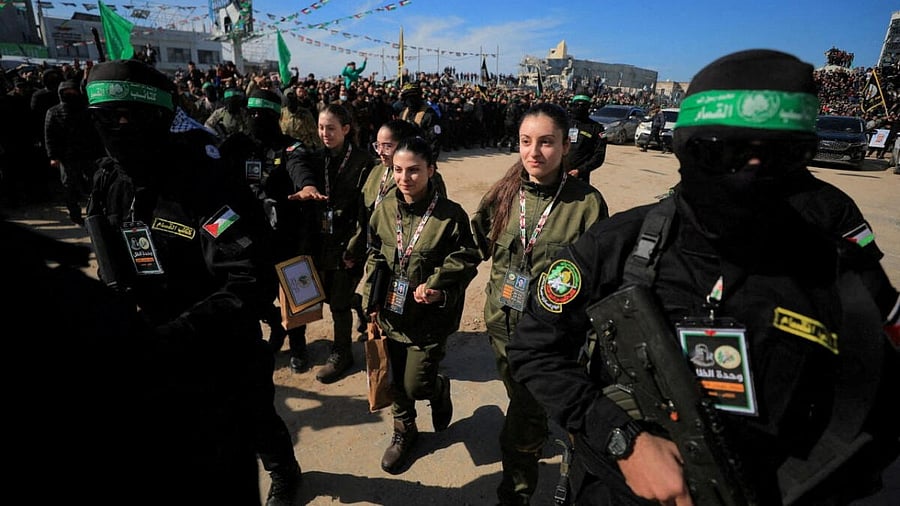
Four Israeli female soldiers, Naama Levy, Liri Albag, Daniella Gilboa and Karina Ariev, are released by Hamas militants as part of a ceasefire and a hostages-prisoners swap deal between Hamas and Israel, in Gaza City.
Credit: Reuters Photo
Jerusalem: Arbel Yehud is the female Israeli hostage at the center of the crisis testing the ceasefire agreement between Israel and Hamas. She was seized during the Hamas-led assault on October 7, 2023, from her home in Nir Oz, a village in southern Israel near the border of the Palestinian enclave.
Yehud, who was 28 at the time, was kidnapped along with her partner, Ariel Cunio, who also remains in the Gaza Strip.
Yehud is the last female civilian hostage that Israel believes is most likely alive. Another civilian woman, Shiri Bibas, remains in Gaza after she was abducted from Nir Oz with her two young sons, Ariel, who was 4 at the time, and Kfir, who was 9 months. The Israeli military has expressed grave concern for the lives of Bibas and her children, though their deaths have not been confirmed.
Yehud's brother, Dolev Yehud, was missing for months and was also assumed to have been kidnapped. It later became clear that he never made it into Gaza: In June 2024, Israeli authorities declared him dead after his remains were identified in Nir Oz through new testing.
Under the terms of the ceasefire deal, Arbel Yehud should have been among the first two groups of hostages released on Jan. 19 and on Saturday, according to Israeli authorities. Israel had demanded that its female civilians be released before the captive female soldiers, four of whom were released Saturday.
It appears Yehud may be in the custody of another group, Palestinian Islamic Jihad. An official with that group told The New York Times on Sunday that she would be released before next Saturday.
Just after midnight Monday, Israel, Qatar and Hamas announced that a resolution had been finalized for the release of Yehud and two other Israeli hostages by next Friday, with three more hostages to be released Saturday. In exchange, Israel would begin allowing Palestinians in Gaza who had been displaced to return to the north of the enclave, the officials said.
Yehud has deep roots in the community of Nir Oz as a third-generation member of her family to reside there, according to the Hostages and Missing Families Forum, a grassroots organization that advocates for the release of the hostages. She worked in the community's education system before becoming a guide at GrooveTech, an innovative learning center in southern Israel that focuses on space exploration and technology.
Yehud and Cunio had returned from a tour in South America shortly before the 2023 attack, according to the forum.
Nir Oz has become a symbol of the Israeli military, intelligence and government debacle that led up to the attack and failed to protect the country's citizens that day. It was a small kibbutz, or communal village, of roughly 400 people before the attack, during which more than a quarter of its population were killed or kidnapped.
Speaking at a protest on behalf of the female hostages in New York in December, Lian Weiss, a relative of Yehud, pleaded for their release. "Please close your eyes for a moment and imagine: Imagine it is you. You are ripped from your home," she said. "We cannot let this become their forever. Every moment we delay is another moment of agony for these women. We must act. We have the power to change their fate."